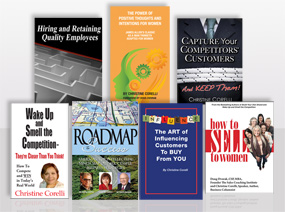
As a business professional, your success is largely dependent upon your ability to build strong relationships with your customers, potential customers, suppliers, employees, vendors, and peers.
While effective interpersonal and communication skills play a major role, you also must be able to project the “right stuff.” Your words, expressions, and actions must reveal admirable qualities that project a positive image to others in order to build trusting relationships.
As you interact with others throughout your day, work to create an image of having the “right stuff” by continually projecting the following desirable characteristics:
Being Trustworthy
Business or personal, good relationships are built on a shared sense of trust. Without trust, you will never be able to establish or develop a quality relationship. Trust is the foundation for reliability, dependability, and good faith.
Being Honest
Trust evolves from honesty in all actions and transactions. Honesty is critical to building strong relationships. When things go wrong or if a problem occurs, honesty is always the best policy.
Own up to your mistakes or you will lose face. If you apologize sincerely, the person will be more likely to be understanding and accepting.
If you, or your company, begin an important strategic initiative but, you’re not completely sure it will work, say so. People will respect your honesty. Be sure to add “I’m not totally convinced it will work, but I’m asking for your support and commitment to do your best to support the decision.
If you are in sales, make sure you are upfront and honest from the very first day. Promise only what you know you can deliver. Better yet, always under-promise and over-deliver. If your price is higher than your competitors, make sure you tell your customer. Then review the quality and value they will receive with your company. Being completely honest will ensure trust.
Being Ethical
Display the highest moral standards; always do what’s right. If you don’t, you will pay the price. Think about those executives who did not live up to the highest moral standards and ended up on the front page of the business page—with indictments. While this is a bit extreme for most people, being ethical is critical to your reputation.
Having Integrity
Without integrity, you will never convince anyone that you are going to do what you say you are going to do. The old adages, “walking your talk,” “practicing what you preach,” or “doing unto others,” reflect the importance of projecting integrity. Never stretch the truth or tell little white lies just to win people over. Practicing integrity also means never, however tempting, badmouthing a competitor. Living a life of integrity will prove worthwhile and bring some very good things in the long run.
Being a true Business Professional
Projecting the highest degree of professionalism is key to building strong relationships and making a positive impression. Interestingly, when asked, most people don’t know how to define it or describe it.
Professionalism is an attitude. It is projected in your appearance, how you sound, how you carry yourself, and in your attitudes and behaviors. It is based on your values and on your understanding of your job role. Ultimately, it is evidenced by the actions you take. It is demonstrated by the following:
• Dressing in a manner that is appropriate as well as impressive.
• Always being punctual.
• Being prepared, organized, and always following through on your assignments.
• Being accountable by taking ownership of your work, handling a problem, or working with customers. It means
knowing you are liable for results.
• Being attentive to important details.
• Being neat, clean, well groomed, and impeccably dressed.
• Staying in control of your emotions.
• Encouraging teamwork.
• Being respectful of others.
• Taking care of company property.
• Helping colleagues— even when there’s nothing in it for you and when the task doesn’t fall under your job description.
Displaying Confidence
If you want to influence people to follow your lead, buy your products, or listen to your ideas, speak with confidence. Refrain from dodging tough questions, or responding evasively when people ask questions regarding important matters. If you are uncertain about something, simply say that you will find out the facts and get back to them. If there is a decision that must be made, and you need to think about it, state that you want to give it some careful consideration before you respond.
You do not have to be right all the time. Just never sound wishy-washy. Even if you are feeling uneasy, strive to project self-assurance, without arrogance or self-righteousness.
Being Humble
While you want to appear confident; you also need project humility—even if you are the boss. Consistently project that you do not see yourself as being superior to others. Too hard for you? Some of the most successful executives, managers, supervisors, and business owners project this quality routinely. They gain trust and strengthen relationships by taking themselves out of first place and giving that role to someone else.
In his best-selling book, Good to Great, author Jim Collins states, “Great leaders have a purpose beyond their own success. …They are a paradoxical blend of personality, humility, and professional will, more like Lincoln and Socrates than Patton or Caesar.”
Being Considerate
Be considerate to others. Call to let them know if you will be delayed even a few minutes. If you are in a leadership position, projecting consideration for your employees will draw your people closer to you and help gain their respect. Be flexible with working mothers. They have to do two jobs well. Ask how you can help them perform their day job more effectively.
Another way to show consideration to others is to ask for their ideas and opinions as you make your decisions. This is vital to building strong relationships with your team.
Being Empathetic
Empathy goes beyond compassion. Here’s the difference. Compassion is the ability to feel the way others feel. Empathy is having the ability to put yourself in another person’s situation, experience their feelings and emotions, and project it back to them.
Being Inspirational
Dale Carnegie said, “Ego hunger is as universal and natural as the hunger for food. The body needs food to survive. The ego needs respect, approval and a sense of accomplishment.”
If you are one of those rare individuals who possess the ability to inspire others, you have a special gift and a positive attitude. When you walk into a room, people will light up. Everyone will enjoy interacting with you.
If you want to learn how to inspire people, you simply need to be positive, provide positive reinforcement, speak in terms of positive outcomes, make people feel good about themselves, and bring out the best in them. If you are a leader, remember the key to employee motivation: Make your people feel they are working WITH you, and not for you.
Showing the Right Stuff
Whether you like it or not, people are always judging you. You need to work to acquire the qualities to ensure that you will be judged positively. In all aspects of your life as a business professional, ask yourself these questions:
1. Would you work for you?
2. Would you buy from you?
3. Would you hire you?
4. Would you want you on your team?
5. Would you promote you?
6. Would you want to be served by you?
As a business professional you can improve your people skills and build better relationships if you have a constant awareness that in every appearance and interaction you must work to project the “Right Stuff.” It is not just the right way to work — it is the only way.
Photo Courtesy of (YDubel) – Flickr

